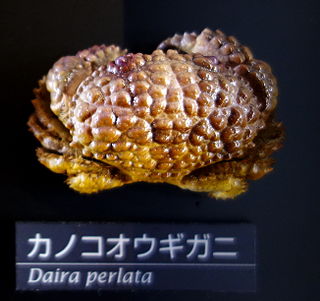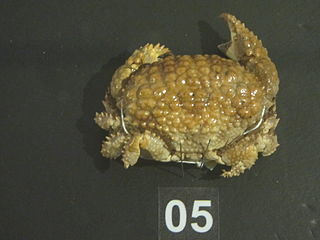
Portunidae is a family of crabs which contains the swimming crabs. Its members include many well-known shoreline crabs, such as the blue crab and velvet crab. Two genera in the family are contrastingly named Scylla and Charybdis; the former contains the economically important species black crab and Scylla paramamosain.

Macrophthalmus is a genus of crabs which are widespread across the Indo-Pacific. It contains the following species : Species in this genus are often referred to as sentinel crabs.

Charybdis is a genus of swimming crabs in the family Portunidae. It is named after the monster Charybdis of Greek mythology.

Palicus is a genus of stilt crabs in the family Palicidae.

Diogenes pugilator is a species of hermit crab, sometimes called the small hermit crab or south-claw hermit crab. It is found from the coast of Angola to as far north as the North Sea, and eastwards through the Mediterranean Sea, Black Sea and Red Sea. Populations of D. pugilator may be kept in check by the predatory crab Liocarcinus depurator.

Percnon gibbesi is a species of crab. It is one of at least two species commonly called Sally Lightfoot, and is also referred to as the nimble spray crab or urchin crab. It has been described as "the most invasive decapod species to enter the Mediterranean".

Dairoidea is a superfamily of crabs, comprising two families which each contain a single genus: Dairidae and Dacryopilumnidae (Dacryopilumnus) .

Neolithodes is a genus of king crabs in the subfamily Lithodinae. They are found in all major oceans, both in high and low latitudes. Although there are records from water as shallow as 70 m (230 ft) in cold regions, most records are much deeper, typically 700–2,000 m (2,300–6,600 ft), with the deepest confirmed at 5,238 m (17,185 ft). They are fairly large to large crabs that typically are reddish in color and spiny, although the size of these spines varies depending on species.

The Panopeidae are a family containing 26 genera of morphologically similar crabs, often known as "mud crabs". Their centers of diversity are the Atlantic Ocean and eastern Pacific Ocean.

Around 65 species of crab occur in the waters of the British Isles. All are marine, with the exception of the introduced Chinese mitten crab, Eriocheir sinensis, which occurs in fresh and brackish water. They range in size from the deep-water species Paromola cuvieri, which can reach a claw span of 1.2 metres, to the pea crab, which is only 4 mm (0.16 in) wide and lives inside mussel shells.

Dardanus venosus, the starry-eyed crab or stareye crab, is a species of hermit crab in the family Diogenidae. It occurs in shallow water on the eastern coasts of America from Florida southward to Brazil. It is sometimes kept in reef aquaria.

Rochinia is a genus of crab in the family Epialtidae, containing the following species:

Dendrophylliidae is a family of stony corals. Most members are azooxanthellate and thus have to capture food with their tentacles instead of relying on photosynthesis to produce their food. The World Register of Marine Species includes these genera in the family:

Ethusidae is one of two extant families of crabs in the superfamily Dorippoidea. It contains four genera. Members of this family are found in marine environments at depths from 16m to 4,192m.

Ethusa mascarone is a species of crabs in the family Ethusidae.

Heterocyathus is a genus of coral of the family Caryophylliidae.

Heteropsammia is a genus of apozooxanthellate corals that belong to the family Dendrophylliidae.

Daira is a genus of crabs and is the only genus in the family Dairidae.

Paragrapsus is a genus of crabs from South Eastern Australia, containing the following species:


















